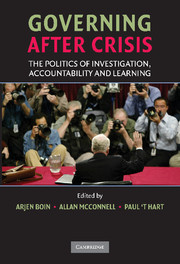Book contents
- Frontmatter
- Contents
- List of illustrations
- List of tables
- Contributors
- Introduction
- Part I Crisis-induced accountability
- 2 Weathering the politics of responsibility and blame: the Bush administration and its response to Hurricane Katrina
- 3 A reversal of fortune: blame games and framing contests after the 3/11 terrorist attacks in Madrid
- 4 Flood response and political survival: Gerhard Schröder and the 2002 Elbe flood in Germany
- 5 The politics of tsunami responses: comparing patterns of blame management in Scandinavia
- 6 Dutroux and dioxin: crisis investigations, elite accountability and institutional reform in Belgium
- Part II Crisis-induced policy change and learning
- Conclusion
- Index
- References
6 - Dutroux and dioxin: crisis investigations, elite accountability and institutional reform in Belgium
Published online by Cambridge University Press: 04 June 2010
- Frontmatter
- Contents
- List of illustrations
- List of tables
- Contributors
- Introduction
- Part I Crisis-induced accountability
- 2 Weathering the politics of responsibility and blame: the Bush administration and its response to Hurricane Katrina
- 3 A reversal of fortune: blame games and framing contests after the 3/11 terrorist attacks in Madrid
- 4 Flood response and political survival: Gerhard Schröder and the 2002 Elbe flood in Germany
- 5 The politics of tsunami responses: comparing patterns of blame management in Scandinavia
- 6 Dutroux and dioxin: crisis investigations, elite accountability and institutional reform in Belgium
- Part II Crisis-induced policy change and learning
- Conclusion
- Index
- References
Summary
Introduction: catalytic crises in the Belgian polity
On 13 August 1996, the Belgian police arrested Marc Dutroux, his wife Michèle Martin and their associate Michel Lelièvre. In the following weeks, these three individuals led the authorities to two kidnapped girls and the dead bodies of four others. It was a gruesome end to what had been a long search for a series of missing children. The fate of the children shocked the nation, and shock turned into anger when it subsequently transpired that a range of mistakes had been made during the investigation. Communications between police and the judiciary had been poor. Judicial authorities in different parts of the country did not cooperate with one another. Families of the victims had been treated disrespectfully, and previous clues leading to Dutroux and his associates had not been checked thoroughly.
The revelations unleashed a storm of public indignation. Suspicions were aired that political and judicial authorities were aiding and abetting paedophile and other criminal networks. In the end, no political casualties ensued from the inquiry that was undertaken, nor could the parties agree on the wide-ranging reform package proposed by the inquiry. With no catharsis resulting from the initial inquiry, the sense of crisis unleashed by the Dutroux affair deepened into an institutional crisis challenging the foundations of not only the justice system and to some extent even the entire Belgian political order (Deweerdt 1997: 497; Barrez 1997: 172–81; Maesschalck 2002; Van den Bossche 2004).
- Type
- Chapter
- Information
- Governing after CrisisThe Politics of Investigation, Accountability and Learning, pp. 148 - 180Publisher: Cambridge University PressPrint publication year: 2008
References
- 3
- Cited by



